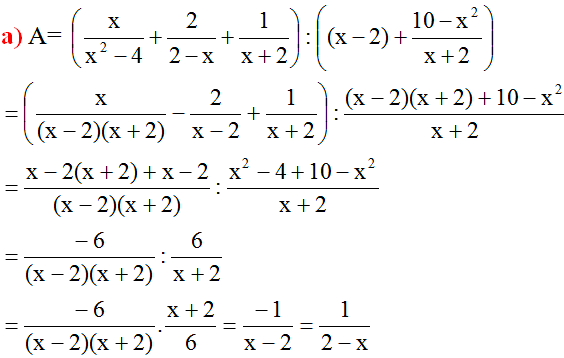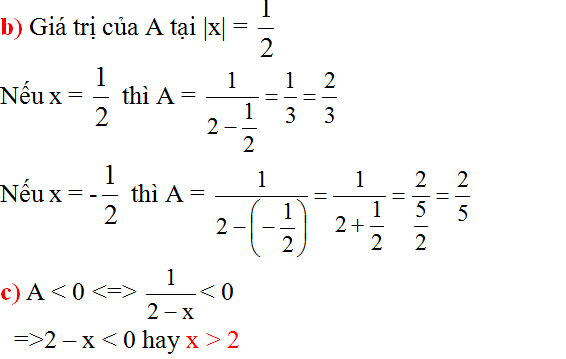Hãy nhập câu hỏi của bạn vào đây, nếu là tài khoản VIP, bạn sẽ được ưu tiên trả lời.

a) P xác định \(\Leftrightarrow\hept{\begin{cases}2x+10\ne0\\x\ne0\\2x\left(x+5\right)\ne0\end{cases}\Leftrightarrow x\ne\left\{-5;0\right\}}\)
b) \(P=\frac{x^2+2x}{2x+10}+\frac{x-5}{x}+\frac{50-5x}{2x\left(x+5\right)}\)
\(P=\frac{x^2\left(x+2\right)}{2x\left(x+5\right)}+\frac{2\left(x-5\right)\left(x+5\right)}{2x\left(x+5\right)}+\frac{5\left(10-x\right)}{2x\left(x+5\right)}\)
\(P=\frac{x^3+2x^2+2x^2-50+50-5x}{2x\left(x+5\right)}\)
\(P=\frac{x^3+4x^2-5x}{2x\left(x+5\right)}\)
\(P=\frac{x^3+5x^2-x^2-5x}{2x\left(x+5\right)}\)
\(P=\frac{x^2\left(x+5\right)-x\left(x+5\right)}{2x\left(x+5\right)}\)
\(P=\frac{\left(x+5\right)\left(x^2-x\right)}{2x\left(x+5\right)}\)
\(P=\frac{x\left(x-1\right)}{2x}\)
\(P=\frac{x-1}{2}\)
c) Để P = 0 thì \(x-1=0\Leftrightarrow x=1\)( thỏa mãn ĐKXĐ )
Để P = 1/4 thì \(\frac{x-1}{2}=\frac{1}{4}\)
\(\Leftrightarrow4\left(x-1\right)=2\)
\(\Leftrightarrow4x-4=2\)
\(\Leftrightarrow4x=6\)
\(\Leftrightarrow x=\frac{3}{2}\)( thỏa mãn ĐKXĐ )
d) Để P > 0 thì \(\frac{x-1}{2}>0\)
Mà 2 > 0, do đó để P > 0 thì \(x-1>0\Leftrightarrow x>1\)
Để P < 0 thì \(\frac{x-1}{2}< 0\)
Mà 2 > 0, do đó để P < 0 thì \(x-1< 0\Leftrightarrow x< 1\)

a, Vì \(2+\frac{3-2x}{5}\)không nhỏ hơn \(\frac{x+3}{4}-x\)
\(\Rightarrow2+\frac{3-2x}{5}\ge\frac{x+3}{4}-x\)
Giải phương trình :
\(2+\frac{3-2x}{5}\ge\frac{x+3}{4}-x\)
\(\Rightarrow\frac{40}{20}+\frac{4\left(3-2x\right)}{20}\ge\frac{5\left(x-3\right)}{20}-\frac{20x}{20}\)
\(\Rightarrow40+12-8x\ge5x-15-20x\)
\(\Rightarrow7x=67\)
\(\Rightarrow x\ge\frac{67}{7}\)
b, \(\frac{2x+1}{6}-\frac{x-2}{9}>-3\)
\(\Rightarrow\frac{3\left(2x+1\right)}{18}-\frac{2\left(x-2\right)}{18}>\frac{-54}{18}\)
\(\Rightarrow6x+3-2x+4>-54\)
\(\Rightarrow4x>-61\)
\(\Rightarrow x>\frac{-61}{4}\)\(\left(1\right)\)
Và : \(x-\frac{x-3}{4}\ge3-\frac{x-3}{12}\)
\(\frac{12x}{12}-\frac{3\left(x-3\right)}{12}\ge\frac{36}{12}-\frac{x-3}{12}\)
\(\Rightarrow12x-3x+9\ge36-x+3\)
\(\Rightarrow10x\ge30\)
\(\Rightarrow x\ge3\)\(\left(2\right)\)
Từ \(\left(1\right)\)và \(\left(2\right)\)\(\Rightarrow\hept{\begin{cases}x>\frac{-61}{4}\\x\ge3\end{cases}\Rightarrow x>3}\)
Vậy với giá trị x > 3 thì x là nghiệm chung của cả 2 bất phương trình

a) Đk: x > 0 và x khác +-1
Ta có: A = \(\left(\frac{x+1}{x}-\frac{1}{1-x}-\frac{x^2-2}{x^2-x}\right):\frac{x^2+x}{x^2-2x+1}\)
A = \(\left[\frac{\left(x-1\right)\left(x+1\right)+x-x^2+2}{x\left(x-1\right)}\right]:\frac{x\left(x+1\right)}{\left(x-1\right)^2}\)
A = \(\frac{x^2-1+x-x^2+2}{x\left(x-1\right)}\cdot\frac{\left(x-1\right)^2}{x\left(x+1\right)}\)
A = \(\frac{x+1}{x}\cdot\frac{x-1}{x\left(x+1\right)}=\frac{x-1}{x^2}\)
b) Ta có: A = \(\frac{x-1}{x^2}=\frac{1}{x}-\frac{1}{x^2}=-\left(\frac{1}{x^2}-\frac{1}{x}+\frac{1}{4}\right)+\frac{1}{4}=-\left(\frac{1}{x}-\frac{1}{2}\right)^2+\frac{1}{4}\le\frac{1}{4}\forall x\)
Dấu "=" xảy ra <=> 1/x - 1/2 = 0 <=> x = 2 (tm)
Vậy MaxA = 1/4 <=> x = 2

a) P xác định \(\Leftrightarrow\hept{\begin{cases}x\ne0\\x+5\ne0\end{cases}\Leftrightarrow\hept{\begin{cases}x\ne0\\x\ne-5\end{cases}}}\)
Vậy P xác định \(\Leftrightarrow\hept{\begin{cases}x\ne0\\x\ne-5\end{cases}}\)
b) \(P=\frac{x^2+2x}{2x+10}+\frac{x-5}{x}+\frac{50-5x}{2x\left(x+5\right)}\)
\(P=\frac{x\left(x+2\right)}{2\left(x+5\right)}+\frac{x-5}{x}+\frac{50-5x}{2x\left(x+5\right)}\)
\(P=\frac{x^2\left(x+2\right)}{2x\left(x+5\right)}+\frac{\left(x-5\right)\left(x+5\right)2}{2x\left(x+5\right)}+\frac{50-5x}{2x\left(x+5\right)}\)
\(P=\frac{x^3+2x^2+2x^2-50+50-5x}{2x\left(x+5\right)}\)
\(P=\frac{x^3+4x^2-5x}{2x\left(x+5\right)}\)
Có: \(P=0\)
\(\Rightarrow P=\frac{x^3+4x^2-5x}{2x\left(x+5\right)}=0\Leftrightarrow x\left(x^2+4x-5\right)=0\Leftrightarrow x^2+4x-5=0\)
\(\Leftrightarrow\left(x^2-x\right)+\left(5x-5\right)=0\)
\(\Leftrightarrow x\left(x-1\right)+5\left(x-1\right)=0\)
\(\Leftrightarrow\left(x-1\right)\left(x+5\right)=0\)
\(\Rightarrow\orbr{\begin{cases}x-1=0\\x+5=0\end{cases}}\Leftrightarrow\orbr{\begin{cases}x=1\\x=-5\end{cases}}\)
Vậy \(P=0\Leftrightarrow\orbr{\begin{cases}x=1\\x=-5\end{cases}}\)

bài1 A=\(\left(\frac{3-x}{x+3}\cdot\frac{x^2+6x+9}{x^2-9}+\frac{x}{x+3}\right):\frac{3x^2}{x+3}\)
=\(\left(-\frac{x-3\cdot\left(x+3\right)^2}{\left(x+3\right)^2\cdot\left(x-3\right)}+\frac{x}{x+3}\right):\frac{3x^2}{x+3}\)
=\(-\frac{x}{x+3}\cdot\frac{x+3}{3x^2}=\frac{-1}{3x}\)
b) thế \(x=-\frac{1}{2}\)vào biểu thức A
\(-\frac{1}{3\cdot\left(-\frac{1}{2}\right)}=\frac{2}{3}\)
c) A=\(-\frac{1}{3x}< 0\)
VÌ (-1) <0 nên 3x>0
x >0

Lời giải của bạn Nhật Linh đúng rồi, tuy nhiên cần thêm điều kiện để A có nghĩa: \(x\ne\pm2\)

a)
\(A=\dfrac{1+x^2+\dfrac{1}{x}}{2+\dfrac{1}{x}}=1\Leftrightarrow\left\{{}\begin{matrix}x\ne0;x\ne-\dfrac{1}{2}\\1+x^2+\dfrac{1}{x}=2+\dfrac{1}{x}\end{matrix}\right.\)
\(\Rightarrow x^2=1\Rightarrow x=\pm1\)




